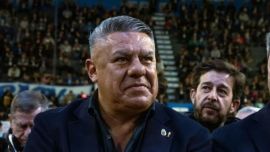It is safe to say that 2022 has been a disappointing year for Colón. After the jubilation of last term, which included the Santa Fe club's first-ever national title triumph in the Copa de la Liga Profesional, they have experienced one of the primary perils for any Argentine club not named Boca Juniors or River Plate: sustaining success from one year to another.
After losing coach Eduardo Domínguez to Independiente, the Sabalero fell short in their attempts to defend that Copa title, failing even to make the play-offs; while in the current Liga Profesional they lie a lowly 24th and are already out of the running for continental qualification. Current interim boss Marcelo Saralegui, who took over from Adrián Marini, is the fourth man to take the helm in 10 months, evidence if any were needed of the most fickle nature of the national game and its intolerance of failure.
That same intolerance also has a far darker side. Two weeks ago the Colón squad received a most unwelcome training ground visit from some two dozen members of the club's barra brava, which ended in the exchange of grave threats and insults and the intervention of police forces to avoid violent confrontation.
Such scenes are sadly not uncommon, and stretch the length and breadth of the country. Earlier this year and following yet another painful defeat Aldosivi's players returned to club headquarters only to find that several cars had been torched in the parking lot. Just last week, meanwhile, one of the few games to features fans from both teams almost ended in tragedy when a group of Quilmes supporters sparked a near-riot in the middle of their side's Copa Argentina defeat to Boca Juniors in Mendoza and even left Quilmes' own head of security with a nasty head wound product of a projectile hurled from the stands.
What marks the Colón case out as unique, though, is the backlash that has occurred not only against the violent element among their supporters but in the club's highest echelons. Following the stand-off, Santa Fe provincial police forces carried out a series of raids in which both suspected barras and Colón directors were placed under arrest. Vice-President Horacio Darrás and Director Lucas Paniagua were both detained and accused of encouraging the 'apriete' (“squeeze”) on the club's own players, and after an express trial pleaded guilty to facilitating the formation of criminal groups at sporting events and for covering up their actions.
“Paniagua held constant direct contact and relations with the leaders of two factions of the Colón group, a relationship which was acknowledged and approved by Darrás,” prosecutors alleged in the hearing, while also affirming that the pair supplied the barra with match-day tickets for resale, members' cards and official Colón merchandise and even paid its chief a regular 'salary.'
The story's ending is bittersweet at best. Colón have in fact enjoyed an upturn in form since the scandal broke, winning their last two games, while Darrás and Paniagua have both resigned their posts and are banned from taking other positions in sporting institutions for several years. But the response of the rest of the Sabalero board was a classic exercise in hand-wringing, exhorting AFA to take measures which it had singularly failed to implement beforehand in order to end such collusion; while the governing body itself stuck with the tried and tested piecemeal gestures which are its go-to in such cases.
Just like in the Aldosivi case, the Colón stadium was closed to fans for a round in response, though at least this time as a small mercy we did not see players from across the Liga take the knee in solidarity with the smoking automobiles in an absurd mirror of Black Lives Matters protests. Real commitment to rooting out the criminal element is needed from both clubs and governors, and the will to do this is still sorely lacking.



















Comments